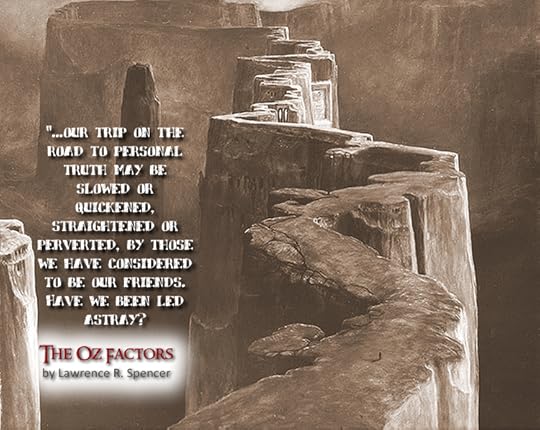Lawrence R. Spencer's Blog, page 16
March 4, 2025
BIRTH AND DEATH
Republished by Blog Post Promoter
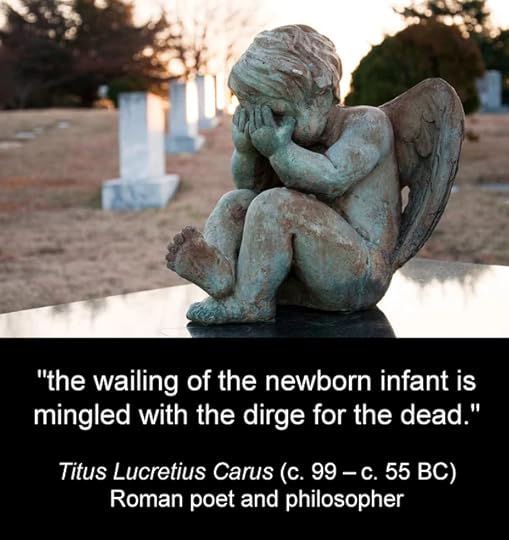 Titus Lucretius Carus ( c. 99 – c. 55 BC) was a Roman poet and philosopher. His only known work is the philosophical poem De rerum natura, a didactic work about the tenets and philosophy of Epicureanism, and which usually is translated into English as On the Nature of Things. Lucretius has been credited with originating the concept of the three-age system that was formalized in 1836.
Titus Lucretius Carus ( c. 99 – c. 55 BC) was a Roman poet and philosopher. His only known work is the philosophical poem De rerum natura, a didactic work about the tenets and philosophy of Epicureanism, and which usually is translated into English as On the Nature of Things. Lucretius has been credited with originating the concept of the three-age system that was formalized in 1836.
March 3, 2025
SCIENCE OF THE SECRET
Republished by Blog Post Promoter
A marvelous video about the origins of the primordial “law of attraction” which appeared in popular “new age” western literature in 1906 with the book titled “Law of Attraction in the Thought World“, written by William Walker Atkinson. (CLICK TO READ IT ON-LINE) This video was produced in 2008 by my friend Venese McNeill, with Chance Gardner and others, reveals the ancient origins and premise of this spiritual phenomena.
March 2, 2025
BLEEP! BLEEP!
Republished by Blog Post Promoter
The Big Bleep is the story of hard-boiled, Harley riding detective Sam Shovel, digging up the truth on a comedic, existential journey of self-realization. It digs deep into the opinions of plants and trees to explore a universe where a fictional characters become self-aware — just like in real life! And, it’s the only book that tells the truth about what REALLY happened to the Earth dinosaurs, and where Superheros go when they retire.
March 1, 2025
THE WAY
Republished by Blog Post Promoter
“The river of human history is clogged and fouled with the putrid refuse of unworkable solutions to the mysteries and problems of life: war, ruined civilizations, insanity, mental anguish, drugs, despair, murder, disease, criminality and starvation. We are the victims of our individual and collective inability to find workable solutions to these unwanted conditions. Our sciences, religion, government and education systems, which should be held responsible, have failed to resolve these basic questions of our existence. As proof, our humanity has long since been exceeded by our ability to destroy life with nuclear and other weapons.
Meanwhile, each of us, knowingly or unknowingly, search for a spiritual way home; a way home to the resolution of the primordial mysteries of our existence: Who are we? Where did we come from? What is our purpose? Each step along the road in our search is heavily influenced by the directions we have been given by those who have traveled before us. Our ancestors, friends, teachers, leaders, scientists, philosophers, writers and artists of the past and present serve as guides in our journey. They help to shape our ability to make our own decisions as to which is the wisest route to travel, or whether to travel at all. Yet, our trip on the road to personal truth may be slowed or quickened, straightened or perverted, by those we have considered to be our friends. Have we been led astray?
Our thoughts and conjectures about life and universes are often based on assumptions, unproved theories, hearsay, rumors and misinformation. The actions we take in life may be based on ancient attitudes and archaic practices which are impractical or no longer applicable. Our view of the physical universe and of our own spiritual universes are spawned and nourished by a panoply of educational and environments influences. Lies replace the truth when a vested interest is being served.
Our decision making processes, the road we choose to follow, is a sort of “logic”. The solutions we use to resolve the problems and mysteries of our lives will be workable or unworkable, depending on the workability of our “logic”.
Yet, in the end, the decisions we make, individually and collectively, will influence the road taken by future Man. Our own lives, the duration or extinction of the human race and all life forms on Earth depend on the decisions we make today.
In the midst of this constant decision making process, modern Western civilization is confronted with an unprecedented, uncontrolled explosion of technological innovation, unseen in recorded history. “Reality” is regulated by vested interests who seek personal gain to the detriment of the greater good. Science has become the soulless and impersonal religion of the 21st Century. Our planetary environment is at risk of irreversible damage, bordering on the annihilation of every living creature. Psychiatric drugs and an unseen one-world government are invading our lives like the flying monkeys in the Land of Oz. Encounters of a Third Kind have replaced the gods of mythology with a more tangible awareness that we may not be alone in this universe. New Age archaeology is rediscovering our past and redefining the paradigms of our history with shock waves of revelations that the Theory of Evolution is archaic and unworkable.
“The Oz Factors” analyzes the subject of Western Logic: How was it created? What are its parts? How does it work or fail to work? How does it effect our lives?
Each of twelve Oz Factors are defined as “A COMMON DENOMINATOR OF WESTERN LOGIC WHICH PREVENTS OBSERVATION, UNDERSTANDING, AND THE ATTAINMENT OF A WORKABLE SOLUTION” to problems of human origin and existence. How these factors influence our history, science, philosophy, our lives and our future is clearly demonstrated, offering a wide variety of new theories as possible alternative routes to the traditional directions we have followed in the past.
The story of “The Wizard of Oz” is used as an analogy through which the reader can more easily understand unfamiliar subjects, in much the same way that Chemistry, for example, can be more easily understood when compared to the familiar subject of cooking; i.e. mixing chemicals in a laboratory is similar to mixing ingredients in a kitchen. The material covered in this book provides examples of incidents which shape our viewpoint of the physical universe and which impinge upon our own personal universes.
“The Oz Factors” offers a simple, yet comprehensive method through which anyone can discover for themselves workable solutions to problems which are considered to be “mysteries” in Western science and philosophy. Discover what is true for you, without religious or academic dogma. Join me in our mutual search for solutions to the primordial questions of existence. May you find a simple and useful road map in “The Oz Factors”.
Lawrence R. Spencer, The Forward to THE OZ FACTORS
February 28, 2025
CHANNELING VISIONS OF JOHANNA
Republished by Blog Post Promoter
As long as I’m having a Dylan Concert, let’s Channel some “Visions Of Johanna”. Visions are a spiritual adventure, my friends. Dream on, dream on….
LYRICS:
Ain’t it just like the night to play tricks when you’re tryin’ to be so quiet ?
We sit here stranded, though we’re all doin our best to deny it
And Louise holds a handfull of rain, tempting you to defy it
Lights flicker from the opposite loft
In this room the heat pipes just cough
The country music station plays soft
But there’s nothing really nothing to turn of
Just Louise and her lover so entwined
And these visions of Johanna that conquer my mind.
In the empty lot where the ladies play blindman’s bluff with the key chain
And the all-night girls they whisper of escapades out on the D-train
We can hear the night watcman click his flashlight
Ask himself if it’s him or them that’s really insane
Louise she’s all right she’s just near
She’s delicate and seems like the mirror
But she just makes it all too concise and too clear
That Johanna’s not here
The ghost of electricity howls in the bones of her face
Where these visions of Johanna have now taken my place.
Now, little boy lost, he takes himself so seriously
He brags of his misery, he likes to live dangerously
And when bringing her name up
He speaks of a farewell kiss to me
He’s sure got a lotta gall to be so useless and all
Muttering small talk at the wall while I’m in the hall
Oh, how can I explain ?
It’s so hard to get on
And these visions of Johanna they kept me up past the dawn.
Inside the museums, Infinity goes up on trial
Voices echo this is what salvation must be like after a while
But Mona Lisa musta had the highway blues
You can tell by the way she smiles
See the primitive wallflower freeze
When the jelly-faced women all sneeze
Hear the one with the mustache say, “Jeeze
I can’t find my knees”
Oh, jewels and binoculars hang from the head of the mule
But these visions of Johanna, they make it all seem so cruel.
The peddler now speaks to the countess who’s pretending to care for him
Saying, “Name me someone that’s not a parasite and I’ll go out and say a prayer for him”
But like Louise always says
“Ya can’t look at much, can ya man ”
As she, herself prepares for him
And Madonna, she still has not showed
We see this empty cage now corrode
Where her cape of the stage once had flowed
The fiddler, he now steps to the road
He writes ev’rything’s been returned which was owed
On the back of the fish truck that loads
While my conscience explodes
The harmonicas play the skeleton keys and the rain
And these visions of Johanna are now all that remain.
February 27, 2025
PEEL A BULB OF GARLIC IN 10 SECONDS
Republished by Blog Post Promoter
Hey, if you’re a vegetarian chef (like me) here’s a really useful tip to speed up your food prep time:
February 26, 2025
FORMS OF REALITY
Republished by Blog Post Promoter
The iconic science fiction writer, Phillip K. Dick is quoted as saying, “”Sometimes the appropriate response to reality is to go insane.” In the case of this video, the producer David Lance is making an excellent attempt.
The Future Forms Of Life from David Lance on Vimeo.
February 23, 2025
ARCHANGEL MICHAEL IS A FEMALE
Republished by Blog Post Promoter
 All of the ancient religious texts of Earth were written by MEN. Every religion and society of Earth have been ruled by MEN. In patriarchal societies, on Earth, men are always the heroic, powerful figures. Women are depicted as weak and subservient, and minimized. One excellent example of how we hide or cover-up the POWER of FEMININE BEINGS is the myth and legends of “Saint Michael“. However, nearly EVERY depiction of “Saint Michael” in art is of a FEMALE!
All of the ancient religious texts of Earth were written by MEN. Every religion and society of Earth have been ruled by MEN. In patriarchal societies, on Earth, men are always the heroic, powerful figures. Women are depicted as weak and subservient, and minimized. One excellent example of how we hide or cover-up the POWER of FEMININE BEINGS is the myth and legends of “Saint Michael“. However, nearly EVERY depiction of “Saint Michael” in art is of a FEMALE!
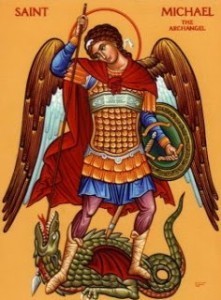 In the New Testament Michael leads God’s armies against Satan‘s forces in the Book of Revelation, where during the war in heaven he defeats Satan. Christian sanctuaries to Michael appeared in the 4th century, when he / she was first seen as a healing angel, and then over time as a protector and the leader of the army of God against the forces of evil.
In the New Testament Michael leads God’s armies against Satan‘s forces in the Book of Revelation, where during the war in heaven he defeats Satan. Christian sanctuaries to Michael appeared in the 4th century, when he / she was first seen as a healing angel, and then over time as a protector and the leader of the army of God against the forces of evil.
Michael in the Hebrew language means “Who is like unto God” or “Who is equal to God” St. Michael has been depicted from earliest Christian times as a commander, who holds in his right hand a spear with which he attacks Lucifer/Satan, and in his left hand a green palm branch.
An increasing number of experts in anthropology, theology and philosophy, believe that Zoroastrianism contains the earliest distillation of prehistoric belief in angels. The Amesha Spentas of Zoroastrianism are likened unto archangels. Simultaneously, they individually inhabit immortal bodies, that operate in the physical world, to protect, guide and inspire humanity, and the spirit world.
The Avesta explains the origin and nature of archangels or Amesha Spentas. To maintain equilibrium, Ahura Mazda engaged in the first act of creation, distinguishing his Holy Spirit (Spenta Mainyu), the Archangel of righteousness. Ahura Mazda also distinguished from himself six more Amesha Spentas, who, along with Spenta Mainyu, aided in the creation of the physical universe.
The Book of Revelation (12:7-9) describes a war in heaven in which Michael, being stronger, defeats Satan: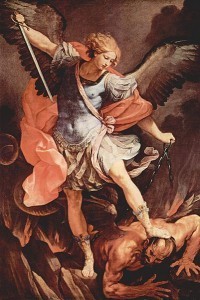
After the conflict, Satan is thrown to earth along with the fallen angels, where he (“that ancient serpent called the devil”) still tries to “lead the whole world astray”. “For if God did not spare angels when they sinned, but cast them into hell and committed them to chains of gloomy darkness to be kept until the judgment …”; of angels cast down to the earth in the War in Heaven; of demons (a demon is a spiritual entity that may be conjured and controlled) or of certain “Watchers”. (The myth of the Watchers began in Lebanon when Aramaic writers tried to interpret the imagery on Mesopotamian stone monuments without being able to read their Akkadian text.)
The Book of Revelation describes a “war in heaven” between angels led by the archangel Michael versus those led by “the dragon”, identified with “the devil and Satan“, who are defeated and thrown down to the earth. The fall of superhuman beings punished for opposing gods also appears in Greek mythology.
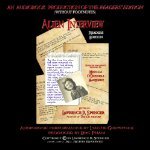 In the book ALIEN INTERVIEW, the officer / pilot and engineer of the crashed UFO from Roswell in 1947 was interviewed and describes itself as a FEMININE ENTITY. Yet, the military invasion force, of which she is a member, has recently invaded this galaxy and conquered the “Old Empire” inter-galactic government which established Earth as a prison planet tens of thousands of years ago. The “War in Heaven” she describes in these interviews was a series of space battles fought in the Earth solar system between The Domain, and the Brothers of The Serpent from the “Old Empire” (Satan / Serpent), which ended approximately 1250 AD, with the victory of her forces.
In the book ALIEN INTERVIEW, the officer / pilot and engineer of the crashed UFO from Roswell in 1947 was interviewed and describes itself as a FEMININE ENTITY. Yet, the military invasion force, of which she is a member, has recently invaded this galaxy and conquered the “Old Empire” inter-galactic government which established Earth as a prison planet tens of thousands of years ago. The “War in Heaven” she describes in these interviews was a series of space battles fought in the Earth solar system between The Domain, and the Brothers of The Serpent from the “Old Empire” (Satan / Serpent), which ended approximately 1250 AD, with the victory of her forces.
The pilot (Airl) describes the benevolent philosophy of “The Domain”, the powerful space civilization of which she is a member:
“Kindness fosters kindness. Cruelty begets cruelty. One must be able and willing to use force, tempered with intelligence, to prevent harm to the innocent. However, extraordinary understanding, self-discipline and courage are required to effectively prevent brutality, without being overwhelmed by the malice that motivated the brutality. Only a demonic, self-serving government would employ a “logic” or “science” to conceive that an “ultimate solution” to any problem is to murder and permanently erase the memory of every artist, genius, skilled manager, and inventor, and cast them into a planetary prison together with political opponents, killers, thieves, perverts, and disabled beings of an entire galaxy!”
If the warriors of The Domain can be FEMININE, why is it not possible that St. Michael is a female?
February 22, 2025
SHERLOCK HOLMES-MY LIFE, Chapter 3
Republished by Blog Post Promoter
CHAPTER 3: THE CALABASH CONUNDRUM
The evening of my return from my visit with Dr. Dodgson I was warmly greeted by my companion, Dr. Watson, when he returned after his day spent attending patients at his office. I was looking forward to his return, as I wished to share my experiences and newly learned methodologies with him.
While I related the events of my recent visit with Professor Dodgson, I began searching for my favorite Calabash pipe so that I might enjoy smoking it while visiting with Watson. My discourse gradually deteriorated as my attention was more frantically drawn away from the discussion by my search.
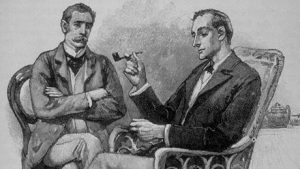 Eventually I paused my narrative altogether as it became evident that the pipe was nowhere to be found in our apartments. I realized that I must have inadvertently left the pipe at the home of Mr. Dodgson, as I had not smoked it during my return trip, or since arriving in London. However, I clearly recalled smoking it while visiting with him which had been only one day hence.
Eventually I paused my narrative altogether as it became evident that the pipe was nowhere to be found in our apartments. I realized that I must have inadvertently left the pipe at the home of Mr. Dodgson, as I had not smoked it during my return trip, or since arriving in London. However, I clearly recalled smoking it while visiting with him which had been only one day hence.
I continued and eventually concluded my discourse upon the various episodes of my visit while smoking a good old briar. Watson was thoroughly interested to learn the outcome of my investigation into the validity, or fallaciousness, of the incident so recently reports about Dodgson in the Times.
I reported my findings to him, with which he seemed to be not the least bit surprised, though understandably irritated at the irresponsibility demonstrated by the press in reporting, as a matter as fact, events that were based solely upon speculation – a habitual reoccurrence which remains so popular with the masses. This sort of sensationalized spittle had become, I regret to observe, a common method to sell newspapers.
The morning following Dr. Watson departed as was his routine, to attend the various ailments of his medical constituency. As it was an unusually bright day, clear for the season in London, I determined to walk to the nearby telegraph office to send a message to Dodgson to inquire about my misplaced Calabash.
My telegram read as follows:
“C. Dodgson, Christ Church, Oxford. Left my Calabash pipe in your quarters on my visit. Please bring same with you on Sunday next to share supper with myself and Dr. Watson. RSVP. Yours, S. Holmes 221B Baker St., London Nw1”
The following day I received confirmation of his intention to dine with us on Sunday:
“S. Holmes, 221B Baker Street, London Nw1. Your Calabash I do possess, will dine with you on Sunday next. C. Dodgson.”
His poetic phrasing on his response was appropriate for a telegram, I thought, delighted to know that my pipe would soon be recovered and that I was to share an enjoyable meeting with my new friend once again. This time, Watson would be in attendance.
In the afternoon of the Sunday following Mr. Dodgson arrived at our flat more than three hours later than I had expected, although not specific time had been set for his arrival. I opened the door myself when I heard his foot upon the stair, anticipating his knock upon the door.
When I opened the door, Mr. Dodgson stood before me. However, he looked at me as though I were a stranger. Then, without acknowledging my cordial greeting and the hand I had extended to shake his, he peered cautiously around the doorway, and with visible astonishment. He did not cross the threshold, but rather vacantly extended a small paper bundle toward me, which I presumed contained my pipe.
“Why, whatever is the matter Charles?”, I said. “You look as though you think someone may be going to attack you! Please, please, come in my friend. I am most pleased to see you again.”
Still hesitating, he looked at me at last and asked me a most peculiar question, which took me quite by surprise.
“Who are you, sir?”, he said.
“Why, you know perfectly well who I am Charles. I am Sherlock Holmes. You have come all the way from Christ Church, at my invitation, to have supper with us and to return the Calabash pipe I left at your quarters when I visited you”, I said with genuine concern for his mental condition. I was sure that some ill had befallen him during his travel. Or, perhaps a seizure, of which he had informed me that he had occasionally suffered.
“Watson!”, I turned and shouted into the apartment. “Come here. Our guest has arrived, but something seems to be amiss with him.
“Don’t worry my friend Dr. Watson is within. He is a medical doctor and will give you any assistance you may need”, I said with cautious concern.
“Holmes?”, he said. “You cannot possible be Sherlock Holmes! You are an obvious imposter, sir! I have just returned from a visit with the creator of the Sherlock Holmes character, Mr. Arthur Doyle, who has a medical practice at 1 Bush Villas in Elm Grove, Southsea.”, he told me. “Therefore, you cannot possibly be a living person and a fictitious character simultaneously!”
I was singularly nonplused and stood back slightly from the threshold of the door in astonishment as this bizarre accusation.
“My dear fellow”, I said, with a growing certainly that the man was suffering a delirium of some sort, “are you quite alright? Please come in. Sit down and let the good doctor have a look at you”.
“I assure you, sir, that I am quite alright. It is you whose behavior is in question here, not mine”, he asserted earnestly. “I ask you again — who are you?”, he demanded to know more emphatically than before.
As he seemed to be quite resolute in this accusation and made no sign of entering into the apartment I stepped forward on to the landing, beckoning Watson to follow me.
“Mr. Doyle is an author of some considerable renown”, continued Dr. Dodgson, insistently. “He explained to me that he created the character of the fictional detective, Sherlock Holmes, whom he modeled after a one of his former university professors, a Mr. Joseph Bell. Therefore, whoever you are, you are most certainly none other than a man who has presumed to capitalize upon the fictional figure of Sherlock Holmes by taking up residence at the very address in London attributed to be the fictitious address of the protagonist of his stories!”, he said with discernable agitation.
Without allowing me to respond he continued with his deluded accusations becoming increasing more agitated all the while.
“When you visited me at Christ Church, I was certain that you were Author Doyle himself, playing a mischievous prank on me. I immediately credited that he was acting out a characterization of the person of a fictional character from one of his own stories as a method of bringing greater authenticity to his writing. This I assumed, because no other logical explanation could possibly present itself. However, when I received your telegram, I responded, not to the fictional address on Baker Street, but to Mr. Doyle’s real address 1 Bush Villas in Elm Grove, Southsea.”
“Dr. Doyle immediately responded to me by telegram, explaining that I had been duped by an imposter, and that he, in fact, although he was aware of my writing, had never met me in person. Furthermore, he explained, that to his knowledge, no one of his acquaintance resided at Baker Street. Indeed, he did not realize that a residence existed at this address.
After having received this rather alarming news, I determined to come around myself to investigate.”, he said. “Therefore, sir, I repeat my question to you once again: who are you?”, he concluded indignantly, withdrawing a pace from the threshold. “If I do not receive a satisfactory answer forthwith, I shall summon a constable to assist me in settling the matter!”
I cannot recall an incident in my entire life that was so utterly confounding as this! I was dumbfounded! By this time Dr. Watson was standing beside me, just inside the door, having overheard the majority of the bizarre accusation leveled against me, and indeed Watson as well. Watson, likewise, remained speechless, neither of us knowing what to make of this, or how to respond!
Watson and I glanced at each other, and then back on Mr. Dodgson, who remained impatiently awaiting a response outside the door.
After a few moments of casting about in my mind for a reply that would offer a reasonable resolution to the bizarre situation, I set upon a course that I hoped to expose more light on this mystery.
“This is not an encouraging opening for a conversation.”, I replied. “I hardly know, sir, just at present — at least I know who I was when I got up this morning, but I think I must have been changed several times since then.”, I said, hoping to entice further information from my visitor.
“What do you mean by that?”, said the Mr. Dodgson sternly. “Explain yourself!’
” I am afraid, sir, that I cannot explain myself”, said I “because I am not myself, you see.”
“I do not see,” said Mr. Dodgson.
“I’m afraid I can’t put it to you more clearly,” I replied politely, “for I cannot understand it myself as yet; and being so many different people in a single day is very confusing”, I said stepping slowly away from the entrance as I spoke, and motioning our visitor with my hand to enter.
“However, I am quite certain that in solving a problem of this sort, the grand thing is to be able to reason backward. That is a very useful accomplishment, and a very easy one, but people do not practice it much. In the everyday affairs of life it is more useful to reason forward, and so the other comes to be neglected. There are fifty who can reason synthetically for one who can reason analytically.”, I postulated, hoping that my attempt at applying scientific method to the problem would appeal to the rational sensibilities which Mr. Dodgson so famously possessed.
As I had hoped, Mr. Dodgson become somewhat less agitated than before at this remark. I therefore proceeded with my appeal to his rationality.
“This is indeed a three pipe problem, to be certain.”, I said. “I beg your kind indulgence for a few moments. Can we not discuss the matter over our supper, which our landlady has so sumptuously provided for us within? Surely, there is nothing to be gained by allowing it to be wasted. And we share a common predicament in that neither of us has a solution to the enigma presented by the information you received from Mr. Doyle, nor by his strange accusations, would you not agree?”, I asked.
He looked somewhat less agitated by my logical posturing, but nonetheless, remained unwilling to enter into the apartment.
“Therefore, would you be kind enough to indulge me with answers to a few questions while we eat? We will leave the door standing open, so that you may depart at your discretion, should you deem it necessary”, I said, bowing toward the interior of our apartment while backing away from the door.
“During the interim, let us send to fetch a constable to be sent up who can verify the identities of both myself and Dr. Watson”, I said.
I rang for Mrs. Hudson to have my boy, Wiggins, of the Baker Street Irregulars, sent up. I instructed Mr. Dodgson to dispatch the boy, in his own words, to seek out a constable and request that he immediately be brought to this address. He did so and the Wiggins sped off with a copper in hand for his trouble.
This seemed to reassure Dr. Dodgson, and he advanced tentatively to the door, peering in cautiously to inspect the interior. Seeing that the supper dishes were indeed set upon the table, with bread and butter, he entered cautiously.
“You can be assured that no harm will befall you here, as you and I have already become acquainted during my visit to your home. Regardless of my actual identity, please allow me to repay you for the kindness of returning my pipe, by sitting down to supper with Dr. Watson and myself.”
This seemed to reassure him further. Dr. Watson took his coat and hat from him, as well as the package containing the pipe, as we seated ourselves at the table.
As Mr. Charles Dodgson, a.k.a Lewis Carroll, stepped cautiously into the room, he observed that the trappings of the apartment were unusually kept, even for two bachelors.
A considerable stack of letters were stuck to the center of the mantelpiece by a jack knife, beside which were a line of reference books, and a black and white ivory box. The letters “V.R.” were spelled in bullet holes on the wall opposite an arm chair. A table was used as an acid-charred bench of chemicals and chemistry paraphernalia, as well as for relics saved from various criminal investigations. Scientific charts were pinioned on the wall. Bundles of manuscripts were stacked in every corner which in no way appeared to be saved for burning in the fireplace, beside which a chair stood on either side. A lamp stood next to one of the chairs. There were also a side board and a shelf next to the another chair containing the American Encyclopedia.
Two broad windows overlooked the street. There were two bedrooms — one upstairs, and one downstairs. A large airy sitting room, contained the sofa, or settee, an arm chair, and of course, the table which was set for supper. A pipe rack stood within reach on the right of the sofa. The side board was empty.
On the wall was a framed picture of General Gordon with a corresponding bare space upon the opposite wall. An unframed picture of Henry Ward Beecher hung above the Encyclopedias. My violin case leaned in a corner next to a coal scuttle containing pipes and tobacco.
After several long moments of surveying his surroundings our wary guest said, “Altogether these apartments do certainly look as though they could be those of the eccentric London detective, Sherlock Holmes. Certainly no one would contrive such a much lived-in and abused set of rooms as these merely to perpetrate a hoax. Nonetheless, I will require investigation into this queer situation before I am well satisfied that there is sensible meaning in it!”
“I assure you, my friend”, I replied, “we are of a single accord in that sentiment, would you not agree Watson?”.
“Most assuredly”, he said, in a puzzled tone, “most assuredly”.
“Life is infinitely stranger than anything which the mind of man could invent”, I observed aloud, both for the benefit of myself and my companions.
I summoned Mrs. Hudson once again and requested that she bring up a bottle of brandy while we awaited the arrival of a constable. No sooner had the brandy been brought up and served the constable arrived with the boy sent to fetch him. He trudged up the steps, somewhat tediously, and propped himself against the door frame with his hand to catch his breath.
“What’s this all about Mr. Holmes?”, he asked. “This young lad here came running up the street to tell me you were in need of immediate assistance. What appears to be the trouble?”
“Please come in. It is Constable Barrett, if my memory serves me correctly, is it not?”, I said, extending my arm to show the officer into the room.
“Yes, indeed, Mr. Holmes. I am Constable Barrett. I met you some time ago. I was with Inspector Lestrade when you were summoned to examine that bloody carpet I was guarding at the murder scene. I am sorry to say that I was foolish enough to let someone in, and leave them alone while they moved things in the room, before you arrived. You was the one that told Inspector Lestrade to take me into a the back room to make me confess that I had done it, which he did, quite vigorously, I might add.”
“Yes, indeed, I remember the case well. The Prime Minister, and Mr. Hope, the Secretary of State for European Affairs, came to me regarding the matter of a document stolen from Mr. Hope’s dispatch box”, I replied.
“Indeed. That was the very case. Well, as I was saying, when Inspector Lestrade and I came back, I informed you that the unauthorized visitor was a young woman. She had fainted at the sight of the blood, and I went out to get some brandy to revive her, but she had left before I got back. You showed me a photograph of her that you already had in your possession. I recognize her in the photograph as the same person who had been the visitor.”
“Yes, yes, my good fellow”, I said to the constable, as though to assure him that his oversight in the case had been forgiven.
“The case at hand is a also a matter of identity which you may be able to assist us in resolving. Our visitor here is Mr. Dodgson who has travelled from Oxford to share supper with us this afternoon. Would you kindly do us the courtesy of confirming the identity of myself and Dr. Watson to him?”
Constable Barrett blinked, looked first at me, then at Watson, and finally at Mr. Dodgson.
“Identity, sir? I fear that I do not understand your question”, he said.
“Let me phrase the question more precisely, constable. Can you verify to this gentleman that I am, indeed, Sherlock Holmes, the consulting detective?”.
“Oh, most certainly sir. You can be as certain of that as I am standing here to tell you so, Mr. Dodgson. Mr. Holmes, here, is one of the finest assets we have at Scotland Yard. As I have mentioned, I can attest to his identity and integrity. That is for certain”, he said bowing courteously to Dodgson.
“Have you any further questions to ask of the constable Mr. Dodgson?”, I asked.
Charles Dodgson looked blankly about himself, then around the room, and at the men awaiting his reply. He then arose to go into the bathroom where he examined his own face in the shaving mirror which hung upon the wall. Having satisfied himself as to the reality of his situation he finally replied, unsteadily, “No further questions”.
I thanked the constable for his prompt assistance. He doffed his hat and departed happily. The three of us finally sat down to eat the meal which Mrs. Hudson had so carefully prepared for us. I am quite certain that Mr. Dodgson felt as though he had been invited to attend a tea party not unlike the one at which Alice became tired of being bombarded with riddles, with the exception that he played the part of the March Hare, I was the Mad Hatter, and Mr. Watson was the Dormouse.
__________________________
READ THE ENTIRE BOOK:



